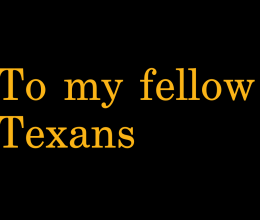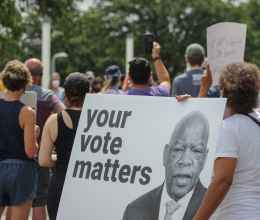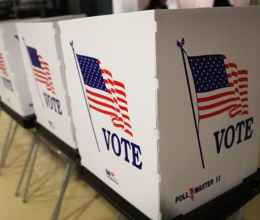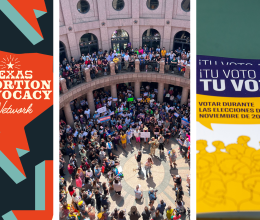
The 5th Circuit’s ruling on Texas’s voter ID law is welcome, but not enough.
It was the best of times, and it was the worst of times. It began slowly enough, with boycotts and bus rides and sit-ins and strikes, and built over time to the clamorous and inexorable crescendo of a beleaguered people fed up with centuries of voicelessness. It was a beautiful thing to behold.
But the fiefdoms of institutionalized racism fought back, with high-pressure hoses and attack dogs and cudgels and guns, leaving a host of martyrs in their wake: Jimmie Lee Jackson, James Reeb, Harry and Harriet Moore, Viola Liuzzo, Vernon Dahmer, and four little girls blown to pieces in a church while changing into their choir robes.
But in the end these martyrs and those who marched with them achieved what was thought by many to be unthinkable: the passage of what was rightly heralded as the singlemost effective piece of civil rights legislation in American history.
As we celebrate the Voting Rights Act’s 50th anniversary, we wish we could say that the landscape had changed. But we’re still lobbing tear gas grenades at peaceful protesters, still killing unarmed black men in the streets, and still doing our level best to keep people of color out of the voting booth.
In 2013 the Supreme Court ruled in Shelby v. Holder that “history did not end in 1965” and struck down portions of the Voting Rights Act it deemed outmoded and unnecessary. Specifically, it removed the “preclearance condition” by which nine states that had systematically disenfranchised black voters were required to submit their voting laws to the federal government for approval before they could be enacted. Texas was among them.
Almost immediately after the decision was handed down, Texas began enforcing the harshest voter ID law in the country that at a stroke disenfranchised 600,000 black and Latino voters. It became instantly clear that the Supreme Court was correct in one sense: history hadn’t ended in 1965. But it also hadn’t changed much.
On Wednesday the 5th Circuit Court of Appeals recognized that Texas’s voter ID law was discriminatory and violated the Voting Rights Act. This was a welcome victory for the hundreds of thousands of Texans who had seen their voting rights stripped away in the last election. But the Court stopped short of finding that the law intentionally discriminates, and the preclearance condition is still absent from federal law. The ruling came too late, and didn’t go nearly far enough.
That the Voting Rights Act passed at all was just shy of a miracle. But we don’t quite require a miracle to restore it to its former glory. All we require is leadership. Congress must work to reinstate the preclearance condition, which is self-evidently every bit as necessary as it was in 1965. Every American’s voice deserves to be heard.
Mark Humphries is the Writer and Content Developer for the ACLU of Texas.





